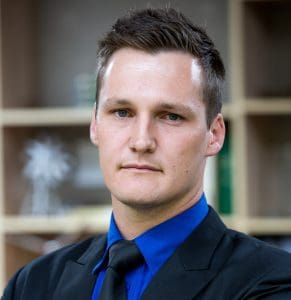 Meet Jarrad Wright
Meet Jarrad Wright
Dr. Jarrad Wright is an electrical engineer from South Africa with PhD and Master of Science degrees from Wits University. In 2022, Jarrad joined the G-PST’s interim Secretariat organization, the National Renewable Energy Laboratory (NREL), in Golden, Colorado after spending six years at G-PST’s regional lead organization, the Council for Scientific and Industrial Research (CSIR) Energy Centre in Pretoria, South Africa.
Tell us about your work with the G-PST Consortium so far.
It has been a good experience in assisting to brainstorm the perspectives of a developing country into what G-PST has become. At CSIR, we were involved from quite early on (not quite from the beginning). Expected responsibilities from CSIR have shifted through time but as a regional lead in Africa serving across Pillars to support developing country System Operators (SOs) has been rewarding thus far. More specifically, getting the South African electrical utility (Eskom) onboard at an early stage has resulted in what will hopefully be some rewarding activities across a few of the G-PST’s Pillars.
In your own words, why is G-PST’s mandate, of supporting system operators through the clean energy transition, so critical?
It is critical to ensure that if a country or jurisdiction has established goals to substantively increase variable renewable energy (VRE) penetration levels, that the responsible SO understands the cutting edge of what research and related activities are necessary and that they are adequately capacitated with a workforce and tools to achieve these goals.
What do you find to be the most meaningful and/or challenging aspect of this work?
With my context coming from a developing economy like South Africa, the combination of leading SOs sharing their experiences combined with essential support and ongoing learning will be critical for South Africa to ramp-up the amount of VRE being integrated within a very short space of time.
Anything else you’d like to highlight?
I just recently transitioned from CSIR in South Africa to NREL in the United States. Aside from the new geographical context, the challenging questions being asked (and answered) at an institution like NREL is what I aspire to contribute to and make impact on. I am excited for what the future holds and can’t wait to continue to learn from some of the best.
